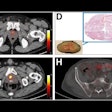
We've all been to disappointing lectures by noted experts. The reasons vary, but a mild anticlimax is commonplace. Perhaps your medical hero has an unexpectedly reedy voice and bad teeth. Or they come across a bit weird -- nasty-and-sinister weird, not pleasant-yet-eccentric weird. It has been said that a professor is like an undescended testicle: difficult to find but when you do then they are often malignant.
 Dr. Paul McCoubrie is a consultant radiologist at Southmead Hospital in Bristol, U.K.
Dr. Paul McCoubrie is a consultant radiologist at Southmead Hospital in Bristol, U.K.
Nevertheless, keynote speakers consistently pull in the crowds, flocking to gather the pearls of wisdom that drip from their cherry lips. However, what often follows is anesthetic induction by PowerPoint. This is the main reason to dread talks by "big names." The speaker, rapt with academic fervor, launches into their talk and promptly loses everyone within the first five minutes.
At worst, these people are so self-absorbed they fail to notice the audience move first from bemusement to disengagement, then from boredom to frank annoyance. Occasionally, they briefly look away from their overcrowded PowerPoint slides and notice the fidgeting, frowning, and yawning. But rather than pausing to reflect, they assume the audience is obviously ignorant and rude. Flushed with annoyance, they speak faster and faster, skipping slides just to get it over with as fast as possible.
The glorious inability of specialists to explain their work is well-recognized. They have known so much about their field for so long that it is difficult for them to even comprehend that normal mortals find such issues difficult to understand. Because they find it easy, they can't see why others don't just get it.
Audiences are normally polite and socially subservient. Consequently, they wouldn't dream of saying they didn't understand a single word. Feedback forms are curiously muted and faintly positive. The expert gets no inkling they were unintelligible, and so the cycle continues.
Threshold concept and ha-ha effect

The curiously named ha-ha (pictured above) is a useful metaphor for the differing perspectives of experts and those listening to them.1 It is a deep ditch used in the U.K. in 18th century country estates to separate gardens from surrounding pasture. It is deliberately invisible from the house so as to give the impression the house is in the midst of untamed nature. However, from the pasture, the sheer brick wall is obvious and impassable.
The expert is standing in the garden; the novice (or audience) is in the pasture. The expert can see no reason why they shouldn't come and join them. The novice clearly cannot access the garden without help.
This unscalable wall represents a threshold concept.2 This notion describes "opening up a new and previously inaccessible way of thinking about something" and represents "a transformed way of understanding, or interpreting, or viewing something without which the learner cannot progress." Coming to grips with a threshold concept is inherently difficult: Extensive knowledge is a prerequisite, and the integration of such knowledge can be counterintuitive. Such concepts take time to grasp; rarely are there epiphanic "Eureka!" moments.
For example, take the silhouette sign on chest radiographs as a radiological threshold concept. Knowledge of physics, anatomy, and pathology are united into a radiological diagnostic sign. You may exclaim, "Pfft: easy-peasy!" but you may change your tune after trying to explain it to third-year medical students. The memory of the transformative process quickly fades. And it is an irreversible process. Once you have climbed over the ha-ha, there is no going back.
So, how can the expert help novices over the ha-ha? The natural response is to create a simplified version of a complex problem. Whilst superficially attractive, this should be avoided as the novices are falsely reassured they are fully trained. Unless the principles are grasped, novices can be unprepared for the complex realities of clinical practice.
The best we can do is to recognize that certain issues are difficult to grasp. Don't expect "first-time" learning: Break the concept down into small parts, explain carefully the thoughts and actions, give simplistic examples, use visual aids, check for understanding, and build up gradually.
Richard Feynman, the late Nobel laureate in physics, prided himself on being able to explain even the most profound ideas to students. His lectures and writings are the epitome of lucidity. But even he knew his limitations. When a TV reporter asked him if he could briefly explain what he won his Nobel Prize for, he replied, "If I could explain it to the average person, I wouldn't have been worth the Nobel Prize."
Dr. Paul McCoubrie is a consultant radiologist at Southmead Hospital in Bristol, U.K.
References
- Kneebone R. Perspective: Simulation and transformational change: The paradox of expertise. Academic Medicine. 2009;84(7):954-957.
- Meyer JHF, Land R. Threshold concepts and troublesome knowledge (2): Epistemological considerations and a conceptual framework for teaching and learning. Higher Education. 2005;49(3):373.
The comments and observations expressed herein do not necessarily reflect the opinions of AuntMinnieEurope.com, nor should they be construed as an endorsement or admonishment of any particular vendor, analyst, industry consultant, or consulting group.


















